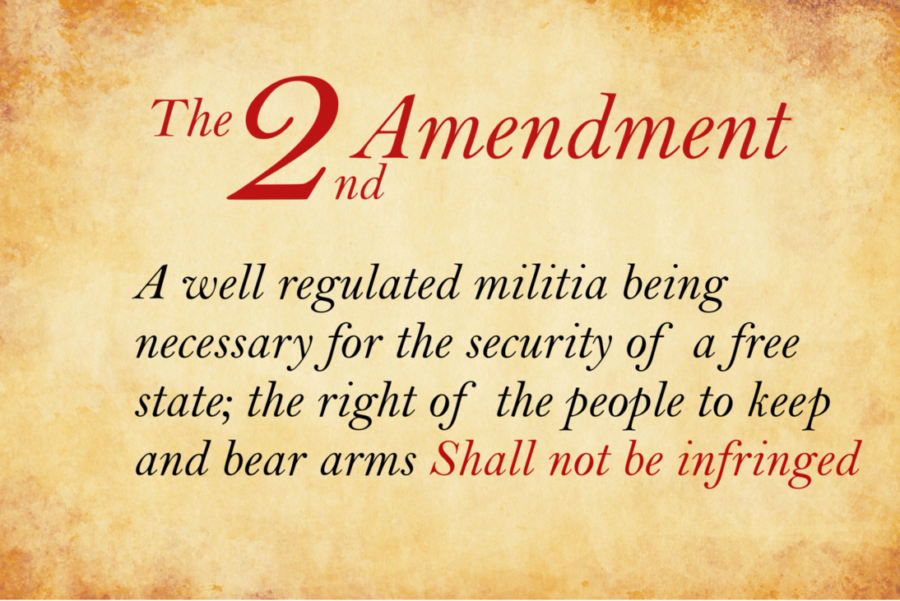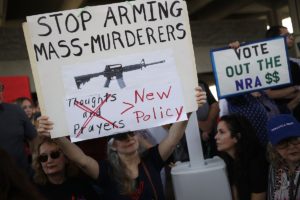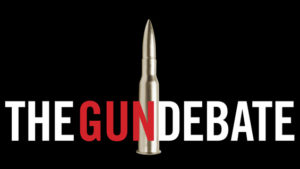Leave My 2nd Amendment Rights Alone
February 26, 2018
“A well-regulated militia, being necessary to the security of a free State, the right of the people to keep and bear arms shall not be infringed.”
Right now I’m going to obliterate some of the arguments revolving around interpretation of the second amendment. If you want to get to the part about gun control measures, skip this paragraph. Here we go: the phrase “well-regulated” meant, and still does mean, functioning in order, as in: “a well-regulated clock.” The “militia,” as intended at the time of writing, meant the armed citizenry, not the Army or the National Guard. The entire clause following the word “State” (the operative clause) is, in any case, not restricted by the first part (the prefatory clause), which declares the purpose of, but does not limit, the operative clause. No, the second amendment does not support the right to own any weapon for any purpose; it is limited by US. v. Miller to weapons in common use. Nor is it only limited to muskets: just as the first amendment protects modern forms of speech, and the fourth amendment protects against modern forms of search, even so does the second amendment protect modern forms of weaponry, including and not limited to semi-automatic rifles (“assault” rifles). More can be found in DC v. Heller.
I wrote a paper once about why a ban on assault weapons was useless and impossible. It is impossible to ban “assault weapons” because Article I, Section 10, Clause 1 prohibits ex post facto laws, which would criminalize something after it’s been done (ex post facto translates to “after the fact”). When the assault weapons ban was enacted in the 90s (Public Safety and Recreational Firearms Act) it merely prohibited the manufacture, sale and possession of semi-automatic rifles made after the act’s passage. In other words, every AR-15 on the market today would be just as easy to acquire with the ban in place although it might get a little more expensive over time. There, impossible and useless. The 1986 ban on fully automatic weapons, likewise, did not criminalize automatic weapons already in circulation, and in fact, it is still possible to obtain one today, if you jump through a few more hoops. Going back to the 90s ban, a National Institute of Justice study concluded thus: “We cannot clearly credit the ban with any of the nation’s recent drop in gun violence. And, indeed, there has been no discernible reduction in the lethality and injuriousness of gun violence.”
Background checks? The number touted about that 92 percent of people are in favor of them doesn’t work out to be true; in the state of Washington, a pretty liberal state, only 59% voted for an initiative that would enact a private sales background check system [x]. That bill Trump signed that allegedly made it easier for mentally ill people to get guns? Both the ACLU and the NRA opposed it, and the Parkland shooter would have passed it because it only applied to people who didn’t manage their own disability benefits, which can include the elderly or the young, and in the words of the ACLU, “no data — none — show that these individuals have a propensity for violence in general or gun violence in particular”. By the way, the Parkland shooter would probably have passed any form of background check anyway, seeing as he didn’t have a criminal history and he wasn’t officially mentally ill, insofar as it would lead to failure of a background check. “Among prisoners who carried a firearm during the offense for which they were serving time in 1997, 14% had bought or traded for the gun from a store, pawnshop, flea market, or gun show… The percentage of inmates receiving their gun from family or friends rose from 34% in 1991 to 40% in 1997,” while getting a gun from the “street or an illegal source” was the source of the firearm for 39% of criminals [x].
In general, the purpose of the Second Amendment is for people to use for hunting, self-defense, and ultimately, as a guarantor of the rights of the people against the government. In fact, the firearm, which has been called, in some cases, the great equalizer, is the guarantor of autonomy and self-security for any individual against any other entity, and it is repugnant to the nature of this right to introduce such strict governmental interference. This is precisely why gun rights advocates oppose background checks for private sales of guns and a national registry of firearms.








Benjamin "Franklin" Shapiro • Mar 20, 2019 at 2:42 PM
Wow, so clever! Thanks, Gabe